- Home
- Marina Oliver
Scandal at the Dower House
Scandal at the Dower House Read online
Scandal at the Dower House
Marina Oliver
Dedication
To the Romantic Novelists’ Association, just completing fifty successful years, and all the members, past and present, who have helped to make this the best writers’ group of all.
Contents
Title Page
Dedication
Chapter One
Chapter Two
Chapter Three
Chapter Four
Chapter Five
Chapter Six
Chapter Seven
Chapter Eight
Chapter Nine
Chapter Ten
Chapter Eleven
Chapter Twelve
Chapter Thirteen
Chapter Fourteen
Chapter Fifteen
Chapter Sixteen
By the Same Author
Copyright
Chapter One
‘YOU HAVE VERY pretty manners, my dear. No trace of the shop floor.’
Lady Keith’s voice was penetrating, and the door to the dining room was still open. Catarina, Countess of Rasen, knew the men must have heard, and did not know whether to be offended, embarrassed, amused or furious. But recalling her pretty manners she refused to reply, instead leading the way into the formal drawing room. After just a few hours in the lady’s company she had concluded Lady Keith was the type of arrogant dowager who prided herself on always saying what she thought, however hurtful or silly. Though in her sixties, she dressed in clothes more suitable to a young girl, with far too many flounces of black satin ribbon and lace, and was adorned with a profusion of jet beads and mourning brooches.
Catarina felt dowdy in comparison. The only black gowns she possessed dated from six years ago, when Lady Unwin, the wife of Walter’s best friend, died. She had not had time or inclination to order more in the few days since Walter’s death.
Her young sister Joanna had no intention of letting the slur pass.
‘Papa never served in or owned a shop,’ she protested. ‘He was a very well-known wine importer; he sold wine to all the best people within a hundred miles of Bristol!’
‘But a merchant, my dear, is not so very different, though I understand your father came from a good family. It seems so vulgar for a gentleman to go into trade, even if he did make a vast amount of money.’
‘Joanna, would you be so kind as to fetch my shawl? I left it in the library earlier, when I was sorting out the papers for his lordship, and I find it grows chilly.’
Joanna, recalled to a sense of decorum by Catarina’s firm tone, blushed and made her escape. Catarina asked her guest if she had visited this part of Somerset before and, by the time Joanna returned, the conversation was proceeding in the well-worn tracks of comparing opinions about places they had visited. It seemed that Lady Keith despised everywhere apart from London and Bath, her childhood home in Gloucestershire, and her late husband’s castle in Scotland.
Catarina tried to include the fourth member of the party, Olivia, in the conversation, but she seemed an exceedingly shy child, intimidated by her aunt, and stammered that she had never been anywhere except home and school. She still looked like a schoolgirl, in her simple gown and with her hair tied back in a long braid. Lady Keith’s injunction to sit up straight, speak up, and look at people when she was answering questions simply threw the poor girl into greater confusion.
Catarina hoped the men would not sit long over the port. All the arrangements with the Reverend Eade had been agreed that afternoon, and Sir Humphrey Unwin would wish to leave for Chase Manor, five miles away, before it grew dark. It was a moonless March night, and he was of a nervous disposition.
Her wishes were granted. Almost on the thought the door opened to admit the new Earl of Rasen, Nicholas Brooke, the most elegant man she had ever encountered in his tight-fitting pantaloons which showed not a crease, discreet waistcoat, intricately tied cravat and a coat which, like his pantaloons, showed every muscle of a trim, strong body. His brother Jeremy, equally elegantly attired, the rector, in a state of genteel shabbiness, and Sir Humphrey, in clothes which had been fashionable twenty years ago, followed him. The latter immediately made his apologies and farewells, tried to deter Lord Brooke from escorting him to the stables and, in a flurry of thanks and promises of any further help he could give dear Catarina, backed out of the room.
Joanna cast a speaking look at her sister, but to the latter’s relief refrained from comment. Catarina could read her mind and felt a great deal of sympathy. Lord Brooke had arrived at Marshington Grange just a few hours ago for the first time, but was already assuming control. It was his right, she reminded herself, but she had been mistress of the house for so long it was hard to relinquish its management to another. It was, however, something she would have to accept when she moved to the Dower House.
Catarina tried to curb her impatience. Surely the funeral was over by now. She was seething with suppressed annoyance as she tried to reply politely to Lady Keith’s inane, often insulting comments. The woman was, she thought, rather like an inquisitive bird with her sharp nose, receding chin and scrawny neck. She had, since her arrival the previous day, found nothing but fault in the house, which was too small and furnished in such an old-fashioned way; the park surrounding it, which had too many trees and not enough deer for her liking; the church, which was undistinguished and at an inconvenient distance; the servants, whose mourning clothes were shabby and who treated Catarina with far too much friendliness and did not keep the proper distance from their mistress who, even if her origins were suspect, was an earl’s widow. At dinner she had picked at her food, tasted each dish and then pushed it away. It was too cold, too tough, too sweet, or tasteless. No wonder she was so skinny.
Catarina moved restlessly to the window overlooking the long sweeping driveway, but none of the returning carriages she hoped to see had yet appeared. The elms, still starkly bare of leaves, were swaying in the March wind, and overhead a canopy of grey cloud made it a fitting day for a funeral. She was paying less than full attention to Lady Keith, until a few stray words made her swing round and stare at that lady.
‘Jeremy?’ she asked. ‘But I understood he is in the army.’
‘Of course, but now that monster is secured on Elba I expect he will sell out. Nicholas has several houses; he can have no need of another. Marshington Grange is rather small, but will do admirably for his brother. I expect the rents from the estate will be enough for its upkeep.’
‘But Bonaparte has escaped from Elba! Sir Humphrey heard the news only yesterday. He told me before the men went to the church.’
Lady Keith went pale. ‘Escaped? But where is he? And why was I not told immediately?’
‘I believe he has landed in France, but Sir Humphrey considers there is no cause for alarm. He doubts the French will want to be involved in more fighting.’
‘What does he, a mere country squire, know about it?’
‘He is a Justice of the Peace, like Walter was. He may live in obscurity now, but he used to be sent on diplomatic missions before his health broke down and he could not tolerate long journeys,’ Catarina said sharply, unable to hide her annoyance. Sir Humphrey had been a good friend ever since she had married Walter, and she would not allow this ridiculous old woman to belittle him.
‘The coaches are coming,’ Joanna interrupted, and Catarina gave a sigh of relief. It would soon be over, tomorrow Lord Brooke, his siblings and their appalling aunt who had accompanied them, she had been informed, as a chaperon, would be gone, and she could be left to mourn Walter and begin to order her new life without him.
She had been married to him eight years ago when she was barely six
teen. Her uncle, Sir Ivor Norton, who had become their guardian when their father had died a year earlier, had been only too glad to dispose of her so advantageously. It had not mattered to him that Walter, recently inheriting from his elderly father, was forty years her senior. He had an ancient title, was much respected; Marshington Grange was an old, prestigious house and the connection gave Sir Ivor and Aunt Hebe a good deal of satisfaction. They expected her to introduce her sister to similarly grand prospective husbands, but Walter despised London society, and very rarely visited the capital, so those hopes had been unfulfilled, and they blamed her for it. She had been naïve, straight from the schoolroom of the Bath seminary, and had been told so often she had believed it, that parents and guardians knew best, and girls accepted any matrimonial arrangements made for them.
It had not been an unhappy eight years. Walter had treated her more as a favourite daughter than a wife, and she had been truly shocked, feeling lost and rudderless, when he had been brought home on a hurdle, having broken his neck in a fall from his horse.
She swallowed hard. For just one more day she had to be strong. Then Lord Brooke would be gone, Joanna returned to Sir Ivor’s house near Bristol, and she could make her own plans.
The coaches were at the door, and she had to show a calm demeanour until the neighbours and friends departed. Bracing herself, smoothing down her skirts with hands which had suddenly become clammy, she moved away from the window and sat in her accustomed chair to one side of the fireplace. Staines, the butler, followed by a footman and two of the housemaids, processed into the room carrying large trays of refreshments.
‘Bring the tea things to me, Staines; I will pour as your – Lady Brooke will be too upset,’ Lady Keith ordered, and Staines, casting an agonized glance at Catarina, hesitated.
Catarina, feeling that she was behaving in a pusillanimous manner, but unwilling to cause embarrassment by insisting on her rights, nodded. She was no longer the mistress of Marshington Grange. The estate was entailed; soon she would not even live here.
The men who had attended the funeral came into the room and all was bustle. The local farmers and landowners, who had not seen Catarina since Walter had died, came over to express their condolences and then, as soon as they decently could, departed.
‘Phew, at last!’ Jeremy exclaimed. ‘I thought they would never go and leave us in peace.’
Catarina considered the man who was likely to be her new neighbour. The same age as herself, he was tall, dark and looked every inch a soldier. He was in one of the top cavalry regiments, she knew, and no doubt turned many female heads when in his regimentals. Even in his mourning clothes he had a foppish air, with everything slightly exaggerated. But he seemed very young to her, used as she was to being with Walter and his friends.
He would be thought handsome in almost any company, but his brother was in every respect more striking, though without the excesses of Jeremy’s costume. He was slightly taller, his hair a shade darker with a deeper wave. His eyes were a darker brown, almost black, his nose more aquiline and his lips more generous. Sometimes, though, he had a rather sardonic air which gave him a devilish look and made Jeremy’s teasing of him as Nick the devil seem apt. She found it odd that he was, at thirty, unmarried. Rich, handsome and heir to an earldom, he would be a big prize on the marriage mart. Was he too aware of his own qualities to consider any girl a fitting mate? Though she had made herself content with Walter, in her girlhood dreams she had wished for a young, handsome suitor. She decided, however, she would not like one so apparently arrogant.
Jeremy was full of smiles, and Catarina suspected he was having difficulty in suppressing his naturally high spirits in a house of mourning. Lord Brooke, on the other hand, seemed to bear the weight of the world on his shoulders. Catarina had yet to see his face relax in a smile. Though perfectly correct in his manner towards her, he was cold, distant, and she wondered if he disliked her.
When all the guests had departed, Walter’s solicitor, Mr Mowbray, who had come down from London the previous day, gave a discreet cough.
‘Your lordship, perhaps it is convenient now to read my late client’s will?’
Catarina barely listened as Mr Mowbray read out a long list of minor legacies, money to the servants and his tenant farmers, personal mementoes to his friends. He had discussed them with her several years ago when the will was drawn up. Then she heard her own name, and glanced up.
Her father had been wealthy; she and Joanna were his only children and she had brought a small fortune to the marriage. She knew she would have that as her jointure, and would have a perfectly adequate, indeed generous, income from the funds where it was invested. She also had her share of the profits in the wine business, which Mr Sinclair, her father’s partner, still ran, and which Walter had always insisted she should have.
‘I leave Marshington Grange, Oaktree Manor and all other entailed property to my cousin, Nicholas Brooke, who will inherit my title. All the non-entailed property is to go to my wife, Catarina, in gratitude for her love and patience during the years we have been together.’
Mr Mowbray pushed back his spectacles. ‘Oaktree Manor, where the late Earl lived before his father died, is let, as you may know.’
‘And just what does that unentailed property consist of?’ Lady Keith interrupted. ‘How much of the estate is entailed? I must say, these legacies to servants are unduly generous in my opinion. How will simple folk know what to do with a hundred pounds or more? It’s asking for trouble to treat them above their station in life.’
‘It was Cousin Walter’s wish,’ Lord Brooke interrupted, and to Catarina’s surprise, his aunt reacted to the sudden steely tone in his voice and sat back in her chair, lips pursed, but mercifully silent.
Mr Mowbray glanced from Lord Brooke to Catarina, in obvious embarrassment.
‘I would like to know too,’ Catarina managed. She’d known about the jointure, of course, and had expected some personal memento, perhaps, such as the portrait of her by Sir Joshua Reynolds that Walter had commissioned soon after their marriage, but had supposed the bulk of the estate would go to the new earl.
Mr Mowbray glanced down at his papers. ‘I have a schedule here. There is the London house in Mount Street, which has been let for some years now. The house in Bath, the hunting lodge, and half-a-dozen farms adjacent to the original estate which his lordship purchased many years ago. Then there are his commercial interests. He was, you may recall, very interested in the developments in the textile industries and the mechanical innovations there and elsewhere. You will have, at a rough estimate, my lady, the same income from these sources as from your own jointure.’
It was a distressed Catarina who eventually escaped to the privacy of her room. Lady Keith, restrained while Mr Mowbray had been present, had vented her fury on Catarina the moment the solicitor had departed. None of Lord Brooke’s protests, Olivia’s startled tears, or Jeremy’s embarrassed declarations that it was nothing to do with him, could stem the venom as she insisted that Walter’s money should remain in his family, and help to support the cost of the estate. She accused Catarina of influencing a senile, besotted old fool, and hinted she would make it so unpleasant for her that Catarina would never again dare show her treacherous face to Bath or London society.
Finally Catarina lost her temper and told Lady Keith she was an interfering, jealous old bat who had not cared a jot for Walter when he was alive, had never visited him or paid him any attention, and was resentful that he had found happiness with her.
‘He told me you tried to inveigle him into marriage when he was barely twenty,’ she said, ‘and how thankful he was to have escaped being married to a harridan. For the moment this is still my home and you are no longer welcome here. I expect you to have left before I have to see you again in the morning.’
Later that night, when all the guests had retired, Catarina crept downstairs. She could not sleep and had left the book she was reading in the small parlour. It was a book of sermons
, not something she normally chose to read, but it had seemed appropriate after Walter’s death. Perhaps that would send her to sleep.
As she passed the door of Olivia’s room she heard sobbing, and paused. Was the child ill? She had looked pale and unhappy all the time she had been in the house. Catarina knocked gently on the door and the sobbing ceased. She went quietly into the room to find Olivia huddled on her pillows, looking with terrified eyes towards the door.
‘Oh, it’s only you!’
‘Who did you expect?’
‘Aunt!’
It was said with such heartfelt horror Catarina felt inclined to laugh. But the child was clearly afraid of Lady Keith. She closed the door softly behind her and went to sit on the side of the bed. Taking one of Olivia’s cold hands in hers, she stroked it gently.
‘Tell me. I won’t give you away. What has she done?’
Olivia sniffed. ‘She’s taking me to London, for the Season. She says that because of our cousin’s death I can’t have my come out this year, I have to wear mourning, and I hate black, but she will make me go to call on her friends and things, and I know I’ll hate it! Her friends are all odious; they spend all their time at the British Museum, looking at old stones and Roman things!’
Catarina tried not to laugh at her woeful tone. ‘What does your brother say? Is he willing?’
‘He says she knows best. But whenever I am with her I feel so stupid and I never know what to say. She scolds all the time and I seem to shrivel!’
‘I know just what you mean!’
‘I’d much rather go home to Brooke Court and stay with Shippy.’
‘Shippy?’
‘Miss Shipton, my governess. I was sent to school for a year, but I hated it, and Nicholas asked Shippy to come back. He says she’s more of a companion, but she can still help me with my drawing and French. But Aunt Clara says she will be dismissed. She would have sent her away by now if we hadn’t had to change our plans and come here.’

 Rebel Heart
Rebel Heart Theft of Love
Theft of Love Courtesan of the Saints
Courtesan of the Saints Fatal Slip
Fatal Slip Highwayman's Hazard
Highwayman's Hazard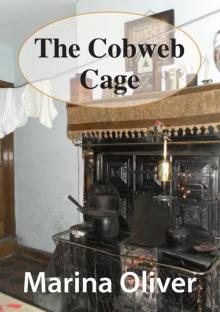 The Cobweb Cage
The Cobweb Cage The Irish Bride
The Irish Bride Apple Blossom Bride
Apple Blossom Bride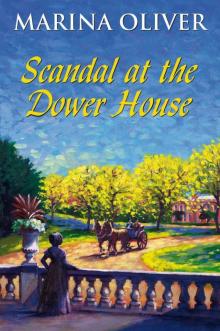 Scandal at the Dower House
Scandal at the Dower House Eugenie and the Earl
Eugenie and the Earl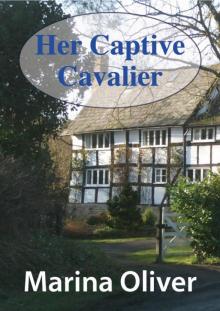 Her Captive Cavalier
Her Captive Cavalier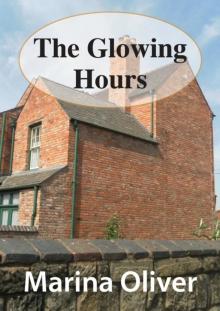 The Glowing Hours
The Glowing Hours Sibylla and the Privateer
Sibylla and the Privateer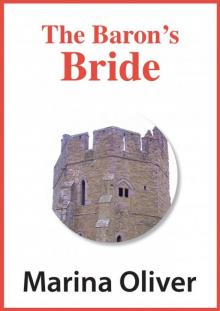 The Baron's Bride
The Baron's Bride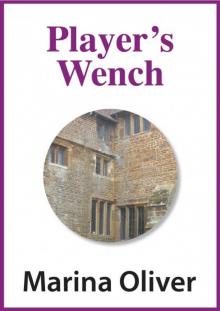 Player's Wench
Player's Wench Gavotte
Gavotte The Chaperone Bride
The Chaperone Bride A Murdered Earl
A Murdered Earl Charms of a Witch
Charms of a Witch Convict Queen
Convict Queen The Accidental Marriage
The Accidental Marriage